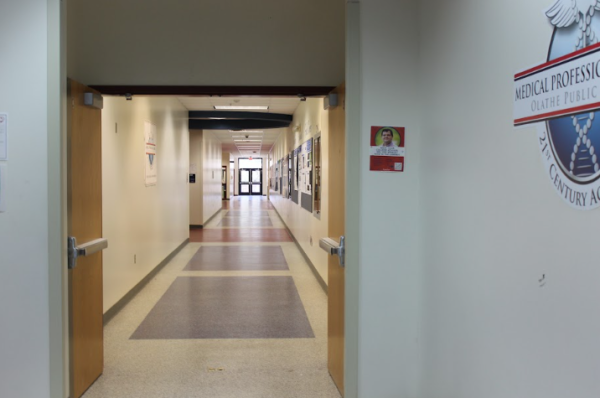Sick Students Plague The Halls
Olathe North students are showing up to school sick more and, more often out of fear to keep their grades high and to attend their extracurricular commitments and sports. Classes, sports, and extracurriculars have taken priority over some of the Olathe North students’ well-being.
“Honestly, I think the biggest reason [students show up sick] is just pressure from grades and classes. People will show up to school if they’re sick because they know they wouldn’t have time to take a test later or stuff like that,” Junior Anjani Vilandai said. “I feel like it would be great if we could change the culture around that.”
The social pressures between teachers and their students as well as between students play a role in pressuring the students to come to school. Between teachers all wanting their sick students to make their classwork up and classmates pressuring their sick friends to come, Barnes elaborates on the stress she feels when she is out sick.
“[The schoolwork] all starts piling up and [the teachers are] are all like ‘You’ll have to come in to get all this stuff and you’ll have to make it all up,’” Junior Chloe Barnes explained.
With these pressures to get all seven classes that a student takes caught up. Students give up a little of their well-being in order to keep the grades up and in place.
“With the friends, they’re all high achievers like myself, and they like to point out how much I’m missing by being gone which stresses me out,” Barnes continued.
When students are coming into school sick, they are sacrificing time that they could be using to get better, and they are impairing their learning. The human brain can only do so many things at once, and if the brain is distracted by being sick, then the student will have a hard time working and learning the material they showed up to school for. This impact is furthered with sluggish thinking and lowered reaction speeds while sick (Brain, Behavior, and Immunity, 2012).
“North obviously has a lot of competition, and we obviously have some very good students here, and I think that that kind of perpetuates a sort of a culture of ‘[If I’m] not doing everything that this person is doing and more then I am failing; I am not going to get good grades, I am not going to get into a good college, and I am not going to have a good career.’ Which is not true, because that is not how things work. That is my general thought on it. The fear of not being good enough,” Junior Emma Steenhard said.
Research has been done to suggest that colds and the flu can cause enough sluggishness to be a hazard on the road. Cognitive impairment can be caused by colds or the flu, and in a test of 15 sick and 10 healthy people in a driving simulation, the sick people reacted slower to hazards as well as less likely to detect an incoming wreck (BMJ Open, 2012).
“I feel that a lot of kids feel pressure to come to school because they feel like they would fall too far behind even if they miss a single day of school. Even if that day is spent taking care of their health, which will arguably make them a better student the next day when they come back and are better,” Steenhard said.
Grades are not the only things impacted for these students. With extracurriculars students can either lose points in classes like cheer, dance, band, or orchestra where participation matters. If a student misses too many theatre rehearsals, they can be cut from many of their scenes. With sports a student can be benched for an injury or sickness if it is too harsh to practice or play on.
“If we are sick, we [dancers] have to sit out and take notes. It’s actually hard because if they change stuff up in the dance then you have to learn those changes, and then you have to apply them when it comes to performances later that week,” Sophomore Kya Carter explained.
This is similar for most sports, and not to mention the practice that must be missed in order to recover completely. As the flu can last anywhere from 5-7 days, rushing the process can make a student or adult feel worse in the long run and put a damper on a student’s performance across the board.
“Honestly, I think the biggest reason [students show up sick] is just pressure from grades and classes. People will show up to school if they’re sick because they know they wouldn’t have time to take a test later or stuff like that,” Junior Anjani Vilandai said. “I feel like it would be great if we could change the culture around that.”
Olathe North Nurse Rhonda Rettig explained that students that are coming in to school sick or not waiting the allotted time for their illness to fully recover are take the chance of spreading their illness throughout the school. Rettig had some advice for people thinking about coming in sick.
“Check in with the nurse … We can do a mini assessment to determine if you really should be here or not. Based on your symptoms we can then guide your parent whether they should take you in to get evaluated. We cannot diagnose students with anything … We can recommend you get an evaluation. We can help you determine how sick you might be,” Rettig said.
Rettig recognized that there is academic pressure for students, along with games, competitions, and fieldtrips that students don’t want to miss. Further, she shared that the nurse’s office is a resource to help students, not just a place to send you home.
“I think a lot of people just come for academic pressure. Like AP students. I mean, everyone’s sick, and they’re just learning … but there aren’t enough hours in the day to make up all the school you miss when you’re sick,” Barnes said.

Number of years on the paper: This is Elizabeth's second year on the paper.
Grade Level: 11th, Junior
Favorite part of Newspaper: "Being able...

Number of years on the paper: This is Sarah's second year on the paper.
Grade Level: 11th, Junior
Favorite part of Newspaper: "Designing and photo...





